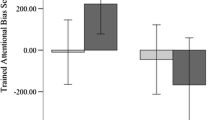Abstract
The present study examined self-focused attention in dysphoria under various mood conditions. Participants were randomly assigned to either a positive, negative, or neutral writing condition. Results indicated that dysphoric participants displayed significantly greater self-focused attention across all conditions relative to the non-dysphoric participants. Taken together, these findings indicate that heightened self-focused attention is a pervasive pattern in dysphoric persons that may contribute to maintenance of a dysphoric mood state.
Similar content being viewed by others
References
Beck, A. T., Steer, R. A., & Brown, G. K. (1996). Beck Depression Inventory: Manual (2nd ed.). San Antonio, TX: The Psychological Corporation.
Berenbaum, H., & Oltmanns, T. F. (1992). Emotional experience and expression in schizophrenia and depression. Journal of Abnormal Psychology, 101, 37–44.
Bradley, M. M., Greenwald, M. K., Petry, M., & Lang, P. J. (1992). Remembering pictures: Pleasure and arousal in memory. Journal of Experimental Psychology: Learning, Memory, and Cognition, 18, 379–390.
Bradley, M. M., & Lang, P. J. (1994). Measuring emotion: The Self-Assessment Manikin and the semantic differential. Journal of Behavior Therapy and Experimental Psychiatry, 25, 49–59.
Clark, D. A., Crewdson, N., & Purdon, C. (1998). No worries, no cares: An investigation into self-reported “nondistress” in college students. Cognitive Therapy and Research, 22, 209–224.
Deldin, P. J., Keller, J., Gergen, J. A., & Miller, G. A. (2001). Cognitive bias and emotion in neuropsychological models of depression. Cognition and Emotion, 15, 787–802.
Edison, J. D., & Adams, H. E. (1992). Depression, self-focus, and social interactions. Journal of Psychopathology and Behavioral Assessment, 14, 1–19.
Fenigstein, A., Scheier, M. F., & Buss, A. H. (1975). Public and private self-consciousness: Assessment and theory. Journal of Clinical Psychology, 43, 522–527.
Flory, J. D., Raeikkoenen, K., Matthews, K. A., & Owens, J. F. (2000). Self-focused attention and mood during everyday social interactions. Personality and Social Psychology Bulletin, 26, 875–883.
Hamilton, N. A., & Ingram, R. E. (2001). Self-focused attention and coping: Attending to the right things. In C. R. Snyder (Ed.), Coping with stress: Effective people and processes (pp. 178–195). New York: Oxford University Press.
Ingram, R. E. (1990). Self-focused attention in clinical disorders: Review and a conceptual model. Psychological Bulletin, 107, 156–176.
Ingram, R. E., & Wisnicki, K. (1999). Situational specificity of self-focused attention in dysphoric states. Cognitive Therapy & Research, 23, 625–636.
Joiner, T. E., Schmidt, K. L., & Metalsky, G. I. (1994). Low-end specificity of the Beck Depression Inventory. Cognitive Therapy and Research, 18, 55–68.
Kendall, P. C., Hollon, S. D., Beck, A. T., Hammen, C. L., & Ingram, R. E. (1987). Issues and recommendations regarding use of the Beck Depression Inventory. Cognitive Therapy and Research, 11, 289–299.
Mineka, S., & Gilboa, E. (1998). Cognitive bias in anxiety and depression. In W. F. Flack Jr. & J. D. Laird (Eds.), Emotions in psychopathology: Theory and research. Series in affective science (pp. 216–228). New York: Oxford University Press.
Mor, N., & Winquist, J. (2002). Self-focused attention and negative affect: A meta-analysis. Psychological Bulletin, 128, 638–662.
Nolen-Hoeksema, S. (2000). The role of rumination in depressive disorders and mixed anxiety/depressive symptoms. Journal of Abnormal Psychology, 109, 504–511.
Nolen-Hoeksema, S., & Morrow, J. (1991). A prospective study of depression and posttraumatic stress symptoms after a natural disaster, the 1989 Loma Prieta earthquake. Journal of Personality and Social Psychology, 61, 115–121.
Pennebaker, J. W. (1997). Writing about emotional experiences as a therapeutic process. Psychological Science, 8, 162–166.
Pennebaker, J. W., & Francis, M. (1996). Cognitive, emotional, and language processes in disclosure. Cognition and Emotion, 10, 601–626.
Pennebaker, J. W., Francis, M. E., & Booth, R. J. (2001). Linguistic Inquiry and Word Count (LIWC): LIWC2001. Mahwah, NJ: Erlbaum Publishers.
Pyszczynski, T., & Greenberg, J. (1985). Depression and preference for self-focusing stimuli following success and failure. Journal of Personality and Social Psychology, 49, 1066–1075.
Pyszczynski, T., & Greenberg, J. (1987). Self-regulatory preservation and the depressive self-focusing style: A self-awareness theory of reactive depression. Psychological Bulletin, 102, 122–138.
Rosenthal, R., Rosnow, R. L., & Rubin, D. B. (2000). Contrasts and effect sizes in behavioral research. A correlational approach. Cambridge, UK: Cambridge University Press.
Rude, S. S., Gortner, E. M., & Pennebaker, J. W. (2004). Language use of depressed and depression-vulnerable college students. Cognition and Emotion, 18, 1121–1133.
Salovey, P. (1992). Mood-induced self-focused attention. Journal of Personality and Social Psychology, 62, 699–707.
Segal, Z. V., Williams, J. M. G., & Teasdale, J. D. (2002). Cognitive therapy for depression: A new approach to preventing relapse. New York: Guilford Press.
Silva, P. J., & Abele, A. E. (2002). Can positive affect induce self-focused attention? Methodological and measurement issues. Cognition and Emotion, 16, 845–853.
Sloan, D. M., & Marx, B. P. (2004). Taking pen to hand: Evaluating possible theories underlying written disclosure paradigm. Clinical Psychology: Science and Practice, 11, 121–137.
Sloan, D. M., Strauss, M. E., Quirk, S. W., & Sajatovik, M. (1997). Subjective and expressive emotional responses in depression. Journal of Affective Disorders, 46, 135–141.
Sloan, D. M., Strauss, M. E., & Wisner, K. E. (2001). Diminished pleasurable response in depressed women. Journal of Abnormal Psychology, 110, 488–493.
Walker, W. R., Skowronski, J. J., & Thompson, C. P. (2003). Life is pleasant- and memory helps us to keep it that way! Review of General Psychology, 7, 203–210.
Watson, D., Clark, L. A., Weber, K., & Assenheimer, J. S. (1995). Testing the tripartite model: II. Exploring the symptom structure of anxiety and depression in student, adult, and patient samples. Journal of Abnormal Psychology, 104, 15–25.
Woodruff-Borden, J., Brothers, A. J., & Lister, S. C. (2001). Self-focused attention: Commonalities across psychopathologies and predictors. Behavioural and Cognitive Psychotherapy, 29, 169–178.
Author information
Authors and Affiliations
Corresponding author
Rights and permissions
About this article
Cite this article
Sloan, D.M. It’s All About Me: Self-Focused Attention and Depressed Mood. Cogn Ther Res 29, 279–288 (2005). https://doi.org/10.1007/s10608-005-0511-1
Issue Date:
DOI: https://doi.org/10.1007/s10608-005-0511-1




